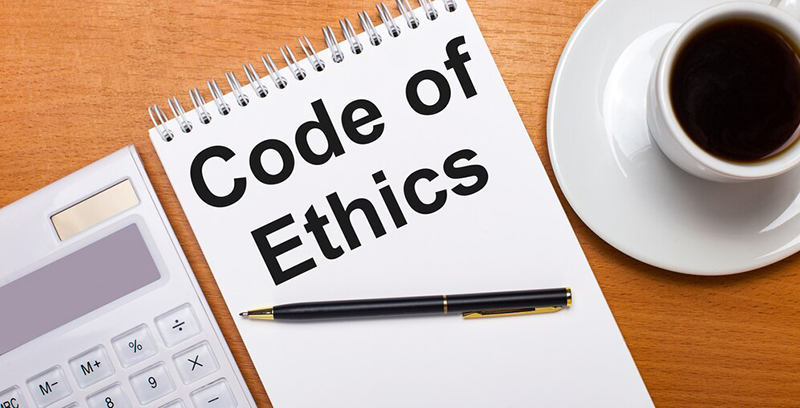
What Is an Ethical Code?
Ethical code is a guide of principles. Others design it to help professionals conduct business honestly and with integrity. Ethical code, also referred to as a “code of ethics”, may encompass various areas, such as business ethics, a code of professional practice, and an employee code of conduct. A code of ethics document may outline the mission and values of the business or organization. It outline how professionals should approach problems. The base of ethical principles is on the organization’s core values. It outline the standards to which professionals are held.
Ethical code is a set of generally accepted principles governing the honesty and integrity of the conduct of the people involved in any activity. There are some organizations involving such as research centers, universities, funding organizations, etc. They raise awareness and apply the Code of Ethics.
KEY TAKEAWAYS
A code of ethics sets out an organization’s ethical guidelines and best practices to follow for honesty, integrity, and professionalism.
For members of an organization, violating the code of ethics can result in sanctions including termination.
In some industries, including banking and finance, specific laws govern business conduct. In others, a code of ethics may be voluntarily adopted.
The main types of codes of ethics include a compliance-based code of ethics, a value-based code of ethics, and a code of ethics among professionals.
A focus on climate change has become an integral part of companies’ codes of ethics, detailing their commitment to sustainability.
What are the Five Ethical Codes?
All companies will have a different code of ethics with different areas of interest. The industry is base of the codes. The five areas that companies typically focus on include integrity, objectivity, professional competence, confidentiality, and professional behavior.
Why Do We Need an Ethical code?
Firstly, according to our values and, in particular, those of Creativity, Learning, Respect, and Vocational Service, there is a need that our activities follow certain principles of integrity. Both honor ourselves and those to whom we provide our services know their value.
Secondly, scientific integrity is an indivisible part of the excellence we seek in our activity.
Finally, there is a need to encourage a culture of scientific ethics. This culture ensures that its principles are famous at all levels of the organization.
Five Principles for Research Ethics
Not that long ago, academicians were often cautious about airing the ethical dilemmas. They faced ethical dilemmas in their research and academic work, but that environment is changing today. There has been a real change in the last 10 years in people talking more frequently and more openly about ethical dilemmas of all sorts.
Indeed, researchers face an array of ethical requirements. In this regard, they must for instance meet professional, institutional, and federal standards for conducting research on human participants, often supervise students they teach, and sort out authorship issues.
Here are five recommendations APA’s Science Directorate gives to help researchers steer clear of ethical quandaries:
- Discuss intellectual property frankly
- Be conscious of multiple roles
- Follow informed-consent rules
- Respect confidentiality and privacy
- Tap into ethics resources.
How to Create an Ethical Code?
Organizations create ethical codes to eliminate unacceptable or immoral behavior from their members. The structure of ethical code is around existing ethical issues within their industry.
The first step for the organization is to identify its priorities, as well as any ethical issues that it wishes to avoid. For example, an organization may want to avoid having conflicts of interest, because of previous scandals in which employees acted against the interests of the company or clients. As a result, their ethical codes might prohibit certain inappropriate relationships, or prohibit employees from any appearance of a conflict of interest.
Code of Ethics vs. Code of Conduct
Ethical code is similar to a code of conduct. Both are sets of professional standards to guide the behavior of an organization’s members.
However, there are some subtle differences: A code of conduct guides the specific actions of a company’s employees. It may contain certain norms of professional responsibility, such as punctuality and accuracy. Most companies have an employee code of conduct, both to maintain professionalism and to prevent friction among their employees.
We use ethical code to ensure that members have sound and unclouded judgment. Examples include the legal codes that prohibit lawyers from accepting cases where they have a conflict of interest or those that prevent brokers from trading against their clients.
For Which Research Projects Ethical Code and Ethics Approval Are Necessary?
REB stands for Research Ethics Board. REB should review and approve the following kinds of research projects before beginning. Ethical code and ethics approval is necessary for the following kinds of research projects:
Quality assurance studies and program evaluations that address a research question.
Research involving living human participants.
Projects involving secondary use of data (use of data initially collected for another purpose) – health records, employee records, student records, computer listings, banked tissue – if any form of identifier is involved and/or if private information pertaining to individuals is involved.
Researches involving human remains, cadavers, tissues, biological fluids, or embryos/fetuses.
The research projects about a living individual in the public arena if they are to be interviewed and/or private papers are accessed.
For Which Research Projects Ethical Code and Ethics Approval Are Not Necessary?
Ethical code and ethics approval is not necessary for the following kinds of research projects:
Consulting, unless carried out under the auspices of the university.
Research about individuals in the public arena using only publicly available or accessible records without contact with the individual(s).
If they involving naturalistic observation in public venues.
The researches involving secondary use of data that do not have any identifier or group of identifiers that would allow the attribution of private information to an individual.
Quality assurance studies, program evaluations, performance reviews, and testing within normal educational and/or organizational requirements, to be used for assessment and/or improvement purposes; as well as when there is no research question involved.
Research based on a review of published/publicly reported literature.
